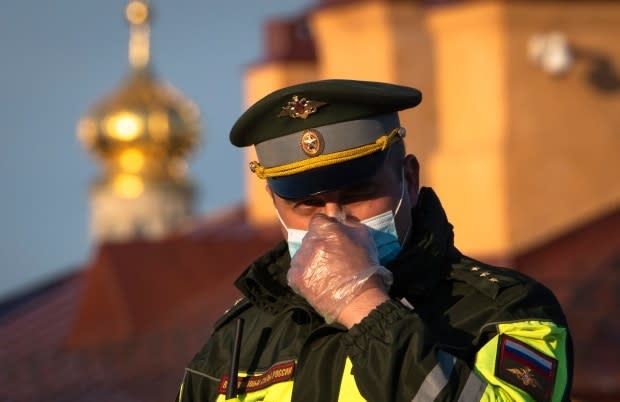Should I hold my breath when people get too close? Your COVID-19 questions answered

We're breaking down what you need to know about the pandemic by answering your questions. You can send us your questions via email at COVID@cbc.ca, and we'll answer as many as we can. We'll publish a selection of answers every weekday on our website, and we're also putting some of your questions to the experts on the air during The National and CBC News Network. So far we've received more than 42,000 emails from all corners of the country.
Should I hold my breath when people get close to me?
You're going in for that shopping cart when someone brushes uncomfortably close, and you instinctively hold your breath. Many of you, like Richard H., are wondering if it can help keep the germs away.
It won't hurt to hold your breath, our experts said, but they also pointed out that it's not really necessary because you're unlikely to contract COVID-19 from passing someone closely — such as in the aisle of a grocery store.
"[Holding your breath] might be marginally beneficial, but unless someone is breathing right in your face or speaking moistly right at you, [it] is unlikely to spread the virus," said Michael Curry, a University of B.C. professor and emergency room doctor at Delta Hospital.
Sumon Chakrabarti, infectious diseases physician at Trillium Health Partners agrees. The risk of catching the virus from someone who is briefly walking by is "essentially zero unless they happen to cough or sneeze directly in your face," he said.
Public health officials say the most important thing is to keep your distance from others and consider wearing a non-medical mask in situations where physical distancing is hard to maintain. Also, wash your hands often and avoid touching your face.

Can I disinfect my cloth mask by putting it in the microwave?
With more people wearing non-medical masks out in public, we're getting lots of questions from readers, including from Robert G., who wants to know if he should zap his mask in the microwave to disinfect it.
The answer is a hard no. You should definitely not put your mask in the microwave because it's a fire hazard.
"Microwave ovens are not designed to heat cloth materials," warned Ontario fire marshal John Pegg earlier this month. "So there is a risk of the mask overheating and catching fire."

If your cloth mask has a metal nose wire, or staples holding the straps, they can also cause sparks or a fire if heated in a microwave, he said.
And it could make your mask less effective.
Steaming or microwaving the mask might theoretically work to kill the virus, said Lynora Saxinger, an infectious disease physician at the University of Alberta.
But the problem with microwaving anything is that "if you exceed the tolerance of the material, you might melt the fibers together," she said.
Instead, Health Canada recommends laundering it on a hot cycle and drying thoroughly.
You can find the answers to more frequently asked mask questions here.
WATCH | How to avoid common mistakes when wearing masks:
How does the virus get from your eyes to your lungs?
We hear it all the time: Don't touch your face.
That's because health experts warn that the mucosal membranes in your nose, mouth and eyes can be pathways for the coronavirus to get into your body.
While it's easy to understand how one can get sick from breathing in a virus that causes respiratory illnesses, Alan S. is curious about how the virus gets from your eyes to your lungs.

Experts say research into this subject is still in its early stages, but this is what they know so far:
Chakrabarti said infections via the eyes usually happen when someone touches them with a contaminated hand.
Then the virus can enter the "nasopharynx through tear duct drainage."
From the tear ducts, the virus has "a straight path into your sinus/throat, where we know the virus typically replicates," said Zain Chagla, infectious disease physician and associate professor at McMaster University in Hamilton.
"From there, it can go down into the lungs."
Chagla said it is hard to know how often people are infected through the eyes, but it's possible. From what is known about other infections, it's more likely you'll get infected through the nose or throat.
As for whether you can get the virus through your ears, we answered that here.
WATCH | We're also answering your questions every night on The National. Last night, we asked our medical specialists: What parts of the world have big COVID-19 outbreaks right now?


